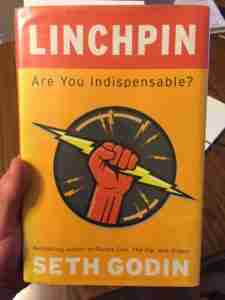I’m not going to lie. My first reaction when I saw the cover of this book? 
No! Of course you’re not indispensable. What use could this crap possibly be to the Church, or to me – simultaneously a pastor and a pastor-in-training.
Then, however, I read the book. And I suggest you do, too!
(Note: affiliate link. I get paid if you make a purchase.)
Seth Godin, bald marketing extraordinaire, is convinced that a paradigm shift has taken place. I’ll quote from his annotated table of contents (which, by the way, I wish all books had):
We have gone from two teams (management and labor) to a third team, the linchpins. These are people who own their own means of production, who can make a difference, lead us, and connect us. The death of the factory means that the entire system we have built our lives around is now upside down. This is either a huge opportunity or a giant threat. Revolutions are frightening because the new benefits sometimes lag behind the old pain. This time, the opportunity is to bring your best self to the marketplace and be rewarded for it (vii).
For the past few generations, we’ve grown used to the implicit deal: If you go to school, learn how to follow instructions, work hard, and show up on time, we’ll take care of you.
But, at least in many sectors, the bargain has fallen apart.
So, Godin advises us to become linchpins in whatever industry we find ourselves. We must treat our work as art, and combine a variety of skills to address complex situations.
We must be able to figure out what to do next, without it being spelled out for us in an instruction manual.
OK, great. But what does this have to do with CHURCH?
I believe pastors are uniquely situated to be linchpins.
They are the leaders of a largely volunteer organization. And, Pastoral Epistles notwithstanding, there is no instruction manual (God forbid we treat the Bible like an instruction manual!).
So they must treat their work as art. If they just phone it in and serve their time, they’ll be left with only the people who phone it in and serve their time as church members!
I believe Christians are uniquely situated to be linchpins in their workplaces.
I plan to write more about this in future posts, but it’s ridiculous how much of the self-help advice out there these days aligns with the things Christians should be the very best at!
A bunch of Godin’s advice centers around treating other people as full human beings, and on giving freely without the expectation of debt or compensation (See chapters “The Powerful Culture of Gifts” and “The Culture of Connection”).
I don’t know about you, but that sounds familiar.
As pastors focus on leading by example – by being linchpins themselves – they could start explicit conversations about the connections between worship on Sunday and work (which should also be worship) on the other six days.
Finally, I believe that each church is uniquely situated to be a linchpin in its community.
What if churches were known for showing artful, personal, and prodigal love to their communities, without expectation of increased attendance on a Sunday morning?
What if we were seeker-sensitive, without selling out to the “latest” corporate and marketing strategies (which, often enough, rely upon the old paradigm)?
What if, especially in North America, we stopped complaining about “persecution,” and started creatively taking advantage of the situations in which we find ourselves?
I don’t have all the answers to these questions, but I’m convinced they’re worth asking!
Godin is convinced that people are starving for personal connection in a world filled with faceless factories and multinational corporations.
I’m convinced that the Church – the Body of Christ – has just the food to feed those starving.
~Josh (@joshuapsteele)
(Note: affiliate link. I get paid if you make a purchase.)